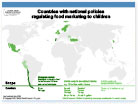The Global Food Research Program recently contributed comments to the World Health Organization (WHO) draft guideline on policies to protect children from the harmful impact of food marketing.
Children worldwide are exposed every day to food marketing where they live, learn, and play — on TV, in and around their schools, at sporting events, in stores, at the movies, while watching videos and playing games online, and on social media. The vast majority of this marketing promotes calorie-dense, nutrient-poor, ultra-processed foods containing added sugar, saturated fat, and sodium well above recommended levels (e.g., sugary breakfast cereals, soft drinks, candies, salty and sugary snacks and baked goods, and fast foods).
The WHO and other health leaders worldwide point to children’s exposure to food marketing as a major risk factor for obesity. They have called for regulations to limit both the amount of marketing children are exposed to and the persuasive power of that marketing. To date, relatively few countries have implemented policies to restrict junk food marketing, and the food and beverage industry has successfully preempted mandatory policies in many countries by pledging to self-regulate their child-targeted promotional activities. Industry self-regulation has proved largely ineffective, underscoring the ongoing need for more and stronger governmental policies.
The WHO recently issued new draft guidelines for policies to protect children from the harmful impact of food marketing, updating previous recommendations based on more recent evidence and research. The Global Food Research Program was pleased to submit our comments to the public consultation, which closed July 31, 2022. Our key recommendations include:
- Advocating for a stronger focus on human rights and equity, in particular all children’s right to a healthy childhood that is free from economic exploitation, discrimination, and invasions of privacy, as guaranteed by The United Nations Convention on the Rights of the Child;
- Strengthening definitions of children, marketing, marketing exposure, and marketing power;
- Including marketing protection in school environments and mandated protection from targeting and tracking children in online environments; and
- Consideration of recent evidence from Chile, which was published after the latest WHO-commissioned systematic review. Chile has the most comprehensive policy to limit unhealthy food marketing to children to date. This was implemented alongside a ban on sales or promotion of regulated foods in schools and a front-of package warning label system. Evidence to date supports enacting mutually reinforcing policies as more effective than single policies. Chilean evaluations also highlight ways that industry might shift marketing strategies in response to regulation, which informs the need for more comprehensive restrictions.
We congratulate the WHO on their work thus far and appreciate the opportunity to contribute to development of the new guideline.
Read our full comments.
RESOURCES
Learn more about the harms of food marketing and policy options to protect children.
View and compare national marketing regulations around the world.


